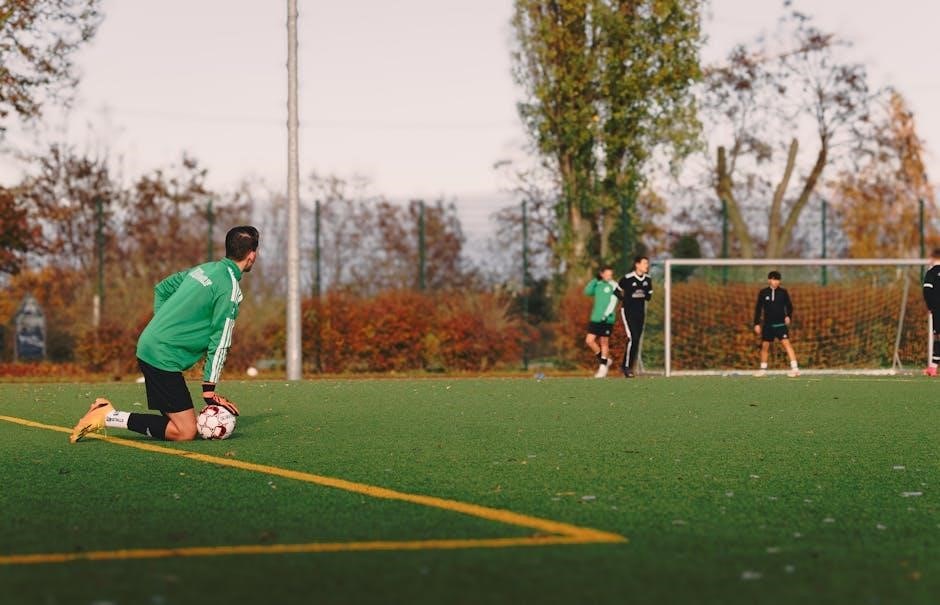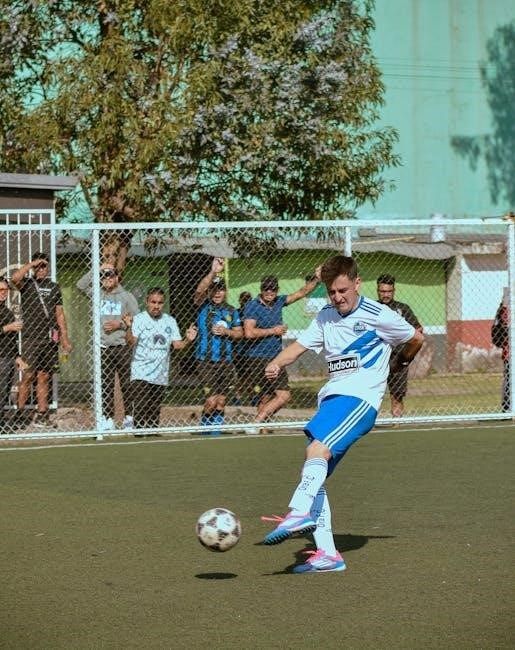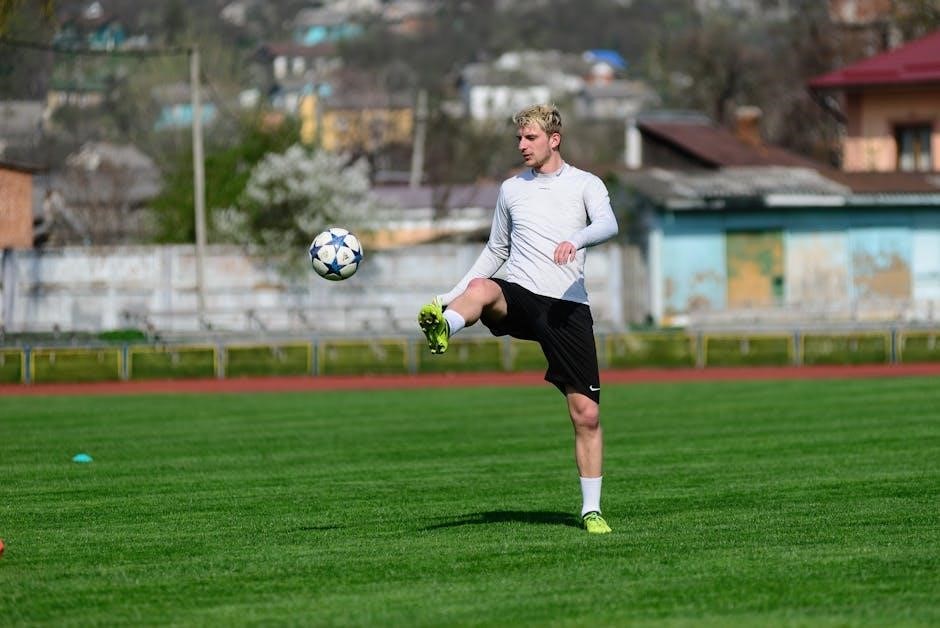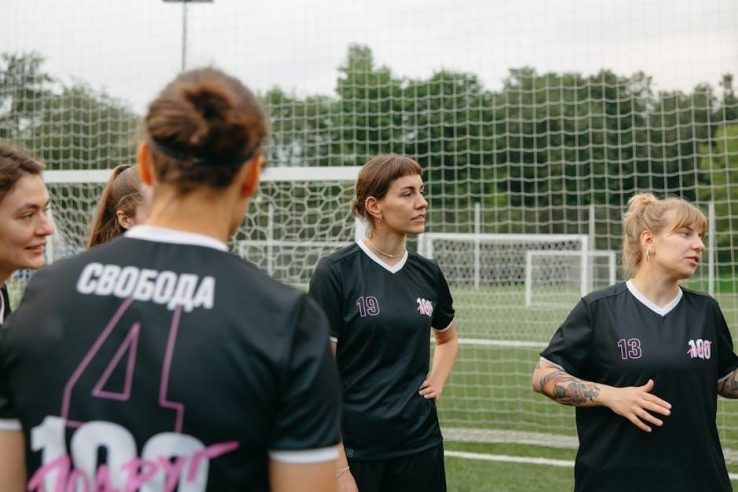Off-season soccer training programs are essential for maintaining fitness and enhancing specific skills. A structured approach ensures players stay competitive and prepare effectively for the next season. Incorporating strength‚ speed‚ and technical drills‚ these programs help athletes achieve peak performance and minimize injuries during the break.
Understanding the Importance of Off-Season Training
Off-season training is vital for soccer players to maintain and enhance their physical fitness‚ technical skills‚ and mental preparedness. It provides a structured period for recovery‚ addressing weaknesses‚ and building strength. By focusing on specific areas like endurance‚ agility‚ and power‚ players can return to the field stronger and more competitive. Consistent off-season efforts ensure a solid foundation for the upcoming season‚ reducing injury risks and improving overall performance. This phase is crucial for long-term development and achieving peak conditioning when the season begins.
Overview of a 12-Month Soccer Training Program
A 12-month soccer training program is designed to ensure continuous improvement and peak performance throughout the year. It is divided into four phases: early pre-season‚ late pre-season‚ in-season‚ and off-season. Each phase focuses on specific goals‚ such as building endurance‚ strength‚ and technical skills. The program emphasizes periodization‚ allowing players to recover and adapt while progressively increasing intensity. By integrating strength‚ conditioning‚ and technical drills‚ the program ensures balanced development and prepares players to perform at their best during the competitive season.

Phases of Off-Season Soccer Training
The off-season is divided into early pre-season‚ late pre-season‚ and closed-season phases‚ each targeting specific objectives like endurance‚ strength‚ and skill refinement to ensure holistic development.
Early Pre-Season Soccer Training
Early pre-season soccer training focuses on building foundational fitness‚ endurance‚ and flexibility. This phase emphasizes aerobic exercises‚ such as sustained runs and interval drills‚ to improve cardiovascular health. Players also engage in strength and mobility workouts to prevent injuries and prepare for more intense training. Skill-specific drills‚ like ball control and passing‚ are introduced to maintain technical proficiency. The goal is to gradually increase physical demands while refining fundamental skills‚ ensuring a smooth transition into the late pre-season phase.

Late Pre-Season Soccer Training
Late pre-season soccer training intensifies physical and tactical preparation. This phase focuses on high-intensity interval training (HIIT)‚ power development‚ and functional strength exercises to enhance explosiveness and speed. Players engage in small-sided games and scenario-based drills to improve decision-making and teamwork. The emphasis is on refining tactical awareness and applying skills in game-like situations‚ ensuring readiness for the upcoming season. This period bridges the gap between off-season conditioning and in-season performance‚ sharpening players’ abilities to compete at peak levels.
Closed or Off-Season Soccer Training
Closed or off-season soccer training focuses on recovery‚ strength building‚ and addressing weaknesses. This phase emphasizes injury prevention through functional movements and flexibility exercises. Players engage in aerobic and anaerobic workouts to maintain cardiovascular fitness. Strength training with weights and plyometrics is prioritized to enhance power and endurance. Skill refinement‚ such as dribbling and ball control‚ is also incorporated to ensure technical proficiency; The goal is to balance rest with targeted exercises‚ preparing athletes for the demands of the upcoming season while avoiding burnout.
Key Components of an Off-Season Soccer Training Program
Off-season training programs focus on strength‚ conditioning‚ speed‚ agility‚ and technical skills. These components ensure players build endurance‚ power‚ and precision‚ preparing them for the upcoming season.
Strength and Conditioning Exercises
Strength and conditioning exercises are vital for building resilience and power during the off-season. These exercises focus on functional movements‚ such as squats‚ lunges‚ and plyometrics‚ to improve muscle stability and explosive power. Incorporating resistance training‚ like weightlifting‚ enhances overall strength and endurance. Additionally‚ core workouts and flexibility routines are essential for injury prevention and maintaining range of motion. A balanced approach ensures players develop the physical foundation needed for peak performance while addressing specific weaknesses. This phase also emphasizes proper recovery to avoid overtraining and maintain progress throughout the program.
Speed‚ Agility‚ and Power Development
Speed‚ agility‚ and power development are critical during the off-season to enhance a player’s explosiveness and quickness on the field. Interval training‚ sprints‚ and ladder drills improve acceleration and agility. Plyometric exercises‚ such as box jumps and burpees‚ boost power and vertical leap. Resistance band workouts and hill sprints further enhance speed and endurance. These exercises are designed to simulate game-like movements‚ ensuring players can rapidly change direction and maintain top speed during matches. By focusing on these elements‚ players can achieve significant improvements in their overall performance and gain a competitive edge. Regular practice is essential for optimal results.

Technical and Tactical Skill Improvement
Off-season training is a prime opportunity to refine technical skills like dribbling‚ passing‚ and shooting. Players focus on ball control‚ precision‚ and consistency through repetitive drills. Tactical awareness is enhanced by studying game scenarios‚ positional play‚ and teamwork strategies. Small-sided games and video analysis help improve decision-making and spatial awareness. This phase ensures players return to the field with sharper instincts‚ better technique‚ and a deeper understanding of the game‚ making them more effective and confident during matches. Continuous practice and feedback are key to mastering these skills.

Mental and Physical Recovery During the Off-Season
Mental and physical recovery is crucial during the off-season to prevent burnout and injuries. Rest‚ mindfulness practices‚ and balanced activity help players recharge and return stronger physically and mentally.
Importance of Rest and Recovery
Rest and recovery are vital components of off-season training‚ allowing the body to heal and rebuild. Adequate rest prevents injuries‚ enhances strength‚ and improves performance. Incorporating activities like light cardio and stretching maintains fitness without overexertion. Ignoring recovery can lead to decreased performance and increased injury risk‚ making it essential to balance rest with training.
Mental Preparation and Mindset Development
Mental preparation is crucial during the off-season‚ as it builds resilience and discipline. Players can benefit from techniques like visualization‚ goal setting‚ and positive self-talk to stay motivated. A strong mindset enhances focus and confidence‚ allowing athletes to overcome challenges. By prioritizing mental development‚ players can align their physical efforts with psychological strength‚ ensuring a well-rounded approach to training and competition. This holistic focus on mental and physical preparation is key to achieving peak performance in the upcoming season.
Nutrition and Lifestyle Guidelines for Off-Season Training
A balanced diet‚ proper hydration‚ and adequate sleep are essential for optimal recovery and performance. Focus on nutrient-rich foods and maintain healthy lifestyle habits to support training goals.
Dietary Recommendations for Soccer Players
A well-balanced diet is crucial for soccer players to optimize performance and recovery. Emphasize complex carbohydrates for energy‚ lean proteins for muscle repair‚ and healthy fats for overall health. Hydration is key‚ with water and electrolyte-rich drinks essential for maintaining fluid balance. Meals should be timed around training sessions‚ with a pre-game meal high in carbs and low in fiber. Avoid heavy‚ processed foods and focus on whole‚ nutrient-dense options. Supplements like protein shakes can support muscle recovery‚ but a natural diet should always be the priority.
Sleep and Recovery Strategies
Sufficient sleep and recovery are vital for physical and mental rejuvenation in soccer players. Aim for 7-9 hours of quality sleep nightly to aid muscle repair and cognitive function. Establish a consistent sleep schedule and create a relaxing bedtime routine to enhance sleep quality. Incorporate recovery techniques such as stretching‚ foam rolling‚ and ice baths to reduce muscle soreness. Prioritize rest days to allow your body to heal and rebuild‚ ensuring optimal performance during training and competition. Proper recovery strategies are as important as the training itself.
Creating a Personalized Off-Season Training Schedule
A tailored training schedule ensures players address specific goals‚ fitness levels‚ and positional needs. Incorporate strength‚ endurance‚ and technical work‚ aligning with long-term development for maximum effectiveness;
Setting Goals and Tracking Progress
Setting clear‚ achievable goals is crucial for off-season success. Players should define short-term and long-term objectives‚ focusing on strength‚ speed‚ and technical skills. Tracking progress through a detailed workout log ensures accountability and motivation. Regularly reviewing goals allows for adjustments and maintains focus. Working with a partner or coach can provide additional support and guidance. By monitoring improvements‚ players can stay on track and build confidence for the upcoming season. A structured approach with measurable milestones ensures steady development and maximizes training efficiency.
Sample 12-Week Off-Season Training Plan
A typical 12-week off-season soccer training plan is divided into phases: endurance (weeks 1-3)‚ strength (weeks 4-6)‚ speed/agility (weeks 7-9)‚ and technical/tactical (weeks 10-12). Each phase includes specific drills‚ such as long runs‚ weightlifting‚ interval sprints‚ and small-sided games. The plan progresses gradually‚ ensuring players build a strong foundation and peak before the season starts. This structured approach helps athletes improve fitness‚ skills‚ and mental preparation‚ ensuring they return to the field ready to compete at their best.
A well-structured off-season soccer training program maximizes benefits‚ ensuring players are prepared for the upcoming season. Emphasizing rest‚ recovery‚ and goal-setting helps athletes return stronger and more focused‚ ready to excel on the field.
Maximizing the Benefits of Off-Season Training
A well-structured off-season program enhances physical and technical abilities‚ ensuring players return stronger and more prepared. Focus on progressive overload‚ balance intensity with recovery‚ and prioritize soccer-specific drills to maximize gains. Incorporating strength‚ speed‚ and agility training‚ along with proper nutrition and mental preparation‚ helps athletes achieve peak performance. Consistency and adherence to the program are key to unlocking full potential and staying ahead of the competition during the next season.
Preparing for the Upcoming Season
A well-structured off-season program ensures players transition seamlessly into the new season. By focusing on progressive overload‚ balance‚ and soccer-specific drills‚ athletes build a strong foundation. Proper nutrition‚ recovery‚ and mental preparation are also crucial. A personalized training schedule helps address individual needs‚ while consistency and gradual progression ensure peak performance. This approach enables players to meet the season’s demands with confidence‚ readiness‚ and a competitive edge‚ setting them up for success from day one.
